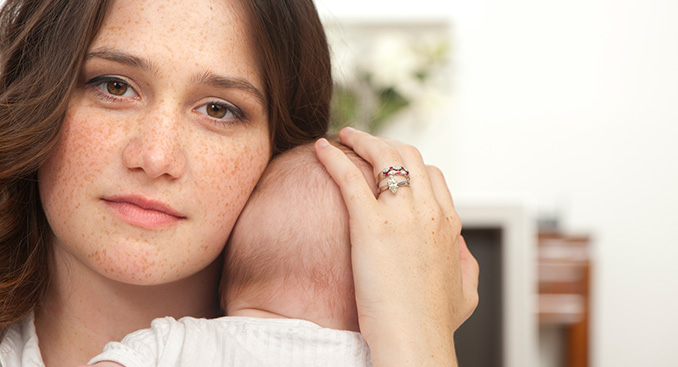Postpartum Depression Symptoms and Solutions

It’s a force of nature. The swings in mood, urge to cry for no reason or feelings of being overwhelmed are common responses for a woman who has just given birth.
These feelings have a perfectly natural, biological explanation, says Casandra Spreen, MD, FACOG, obstetrician/gynecologist with Premier Obstetrics and Gynecology. “There’s a sudden drop in the hormones progesterone and estrogen after delivery that affects the brain and destabilizes mood. You can feel like you’re on an emotional roller coaster, especially if you are under stress. Over half of women after delivery go through a baby blues period.”
Within about two weeks, most women regain a sense of balance. For about one in 10 or 20 women, however, the typical blues can slide into postpartum depression.
“Women with postpartum depression describe a conflict between how they should be feeling and how they’re actually feeling,” Dr. Spreen says. “They may feel guilty about not feeling happier or not being a good mom. This is a deeper, darker mood, where a woman can’t laugh or enjoy food or see anything positive in her life.”
Dr. Spreen says she and her partners screen for postpartum depression during a woman’s six-week checkup after the baby is born. If a woman becomes concerned before the checkup, Dr. Spreen encourages her to schedule with her obstetrician or discuss her concerns with another health provider.
Is There a Solution?
“Postpartum depression is very much triggered by a physical change in your body and brain,” Dr. Spreen emphasizes. “You haven’t done something wrong; your body has just gone through a huge transition.”
She says antidepressant medicines are often the best medical treatment. “Most women improve quickly and can be weaned off the medicine in six to 12 months. They can also continue to breastfeed while taking the medicine.”
Being in a support group with other new moms also can be beneficial for processing feelings and gaining encouragement.
Who Is at Risk?
Although any new mom has the chance of getting postpartum depression, certain factors put some women at greater risk. These include:
- Being a teen – or under age 25
- Having a personal or family history of depression, anxiety or bipolar disorder
- Being under stress due to difficult relationships, financial issues, the new baby’s illness or prematurity, or other factors
- Not having a good support system with family, friends, spouse or partner
Can I Prevent Postpartum Depression?
“We can’t guarantee that any particular thing is going to prevent this,” Dr. Spreen says. “Of course, we encourage overall wellness, building strong support systems and managing your stress.”
Dr. Spreen says if you have a history of depression or mood disorders, talk to your obstetrician about continuing management during your pregnancy. If you’re not already taking antidepressants but have a known history of mood disorders, talk to your doctor about restarting treatment in your third trimester to prevent postpartum depression.
For all women who have recently given birth, she advises, “Don’t be afraid to speak up and reach out to ask if the feelings you’re experiencing are a normal transition or something that needs medical attention.”
Determine Your Risk
New mothers can utilize the Edinburg Postnatal Depression Scale questionare below to determine their risk for postpartum depression.